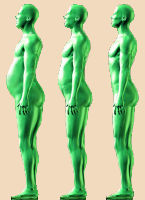
#1 Way to Lighten Your Load Post
 The most common question I'm getting this summer as I talk about my AZT hike is how to lighten a pack. I tell about all the ways I cut out ounces and pounds from gear, but I save the best tip for the end. It costs nothing, is healthy, saves your body work, and makes a much larger impact than all the other gear tweaking you could possibly do.
The most common question I'm getting this summer as I talk about my AZT hike is how to lighten a pack. I tell about all the ways I cut out ounces and pounds from gear, but I save the best tip for the end. It costs nothing, is healthy, saves your body work, and makes a much larger impact than all the other gear tweaking you could possibly do.I reduced my pack weight from around 40 to around 25 pounds by making a light shelter, quilt, and pack, reducing redundancies, and purchasing a few lightweight items. That includes food and water, so carrying less water and stopping more often to tank up can make the pack even lighter. So, I removed about 15 pounds from my pack that I don't have to lug across the country.
During my 6 weeks of hiking the AZT, I lost about 14 pounds. Most of that was in the first 2 weeks and then I stabilized more as I got used to eating, hiking, and sleeping.
Just by losing weight off my body, I nearly reached the weight savings that I got from all the gear tweaking I did! And, I don't really have a lot of excess - I'm 6-1 and weigh about 175 now that I've gained 10lbs of the weight back.
Going into a backpacking trip with the idea of 'Super! This will be a great way for me to lose a few pounds!' is NOT a good idea. Your body will need calories to function properly on the trail and holding back the food it needs will cause you to be weak and increase the risk of injury. If it's a long trek, you will most likely lose some weight anyway, but that should not be your plan. I lost weight because I did not force myself to eat as many calories as I was burning each day - I should have eaten more.
A much better idea is to lose some weight before a trek. For two or three months before your trek, while you're doing practice hikes, also cut back on the ice cream, hamburgers, soda, chips, and all that other fattening stuff. The increased physical exercise will burn from 100 to 150 calories per mile, depending on your body and pack weight. Since there's about 3500 calories in a pound of fat, you can figure out how many miles you'll need to hike to remove 10 pounds of fat. More than you thought, huh?
But, that fat won't burn off if you increase your calorie intake. Thoughts like, 'Hey, I hiked 6 miles. I can have a second bratwurst' will thwart your efforts. Self-discipline is the key to long-term weight lose. Or, hire a personal trainer if money is no object. :-)
However you do it, losing weight before starting a backpacking trip or long hike is the best way to reduce the complete package you need to haul over mountains and valleys.
Hike On
Posted: 13:33 06-30-2012 869
Prev: Morning Hiking
Next: Possum SocksSite Disclosure Statement
Next: Possum Socks
archives: 2025 2024 2023 2022 2021 2020 2019 2018 2017 2016 2015 2014 2013 2012 2011
Find more Hiking Resources at www.HikingDude.com


Follow Me
Recent Comments